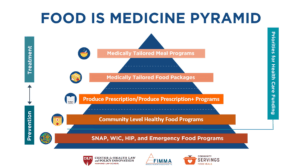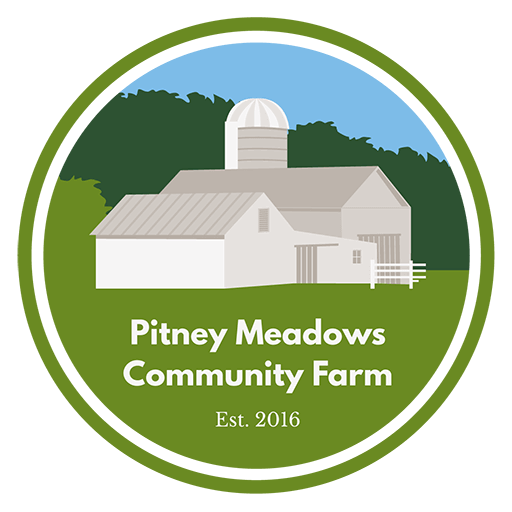Food as Medicine: A Path to Healthier, Thriving Communities
In the face of federal funding cuts for local food and hunger relief programs, Pitney Meadows Community Farm and the Saratoga Hospital Community of Excellence are thrilled to announce the receipt of funding from the international nonprofit Health Care Without Harm for a groundbreaking Food is Medicine pilot project in Saratoga County. Please note that 'Food as Medicine' (FAM) may also be referred to by other terms such as 'Food is Medicine' (FIM), 'Food as Health' (FAH), or 'Food is Health' (FIH). While we use the acronym FAM, other initiatives in different towns, cities, regions, or states may use different acronyms.
This funding will enable us to advance our Food as Medicine (FAM) initiatives in Saratoga County by partnering with other farmers, producers, and organizations to provide health-promoting food to our community. Our FAM pilot program builds up our local farming economy and, at the same time, puts nutritious, locally-sourced food into the kitchens of neighbors facing chronic diseases and inadequate food access.
At Pitney Meadows Community Farm, we believe that food is more than just fuel for the body… it’s nourishment for the mind, spirit, and entire being. As a space where nature, education, and community come together, we’re committed to nurturing the health of our community in every way we can.
“Health Care Without Harm recognizes the critical intersection between healthcare and the food system,” said Brooke McConnell, Executive Director of Pitney Meadows. “This grant allows us to expand our Food as Medicine program in collaboration with local partners while supporting local farms, ensuring a sustainable and scalable approach to improving health outcomes in our community.”
The Saratoga Hospital Community of Excellence (COE) is a powerful coalition made up of local organizations, healthcare providers, educators, and community leaders, all focused on improving the health and well-being of every resident in the county. Their mission is simple but vital: to create a community where everyone can live well, be well, and thrive. A core focus of COE’s work is the development of a Food as Medicine workgroup led by Pitney Meadows. Formed in 2024, this work group is designing a pilot program to use food not just as sustenance, but as a means to prevent and manage chronic diseases, reduce healthcare costs, and empower individuals to take control of their health.
What Is Food as Medicine?
At its core, Food as Medicine is the practice of integrating food and nutrition directly into healthcare. It recognizes the immense power that food has to influence our health and the way we manage illness. From preventing chronic conditions like type-2 diabetes, obesity, and hypertension, to supporting recovery and overall well-being, Food as Medicine is reshaping how we think about nutrition and healthcare.
The concept goes beyond simply eating healthy—it’s about using food as a preventive and therapeutic tool. The idea is to make nutritious, health-promoting foods accessible to individuals, especially those at risk for diet-related diseases, and to pair it with education and counseling to help people make informed choices about what they eat.
One of the key components of the Food as Medicine Pyramid is the integration of medical care and nutrition. This pyramid includes elements like produce prescriptions, where doctors prescribe fresh, locally-grown fruits and vegetables instead of—or in addition to—medications for managing chronic health conditions.

Food as Medicine in Saratoga County
One of the key strategies of the Saratoga County Communities of Excellence (COE) is the development of Food as Medicine (FAM) initiatives to improve the health and well-being of our community’s residents. To advance this vision, Pitney Meadows and Saratoga Hospital’s Community Health Center have been leading a FAM Workgroup throughout 2024. The workgroup’s goal is to consolidate and build upon existing Food as Medicine programs, evaluate current resources, and address gaps in services across the county.
The FAM workgroup is building on the success of the Nutrition RX program, a five-year partnership between the Saratoga Community Health Center (CHC) and Pitney Meadows, while bringing together expertise from key community partners. Skidmore College’s Environmental Studies program contributes research and analysis, while the Saratoga Center for the Family offers its 'food is mood' approach to nutrition and well-being. Health Care Without Harm provides technical support, Planted Platter further enriches the effort with whole food, plant-based cooking classes and recipes, and local farm partners share valuable food system knowledge. Additionally, dedicated food system volunteers bring research and advocacy to the table.
With this strong foundation, the workgroup is developing a FAM Pilot Program with several key objectives:
- Assess Interest and Engagement: Gather data on how residents in low-income housing communities feel about and engage with healthy food access initiatives. This includes understanding their interest in and willingness to participate in new programs.
- Identify Barriers to Access: Explore the challenges that residents face in accessing fresh, nutritious food, and understand the specific barriers preventing greater participation.
- Expand Access to Local, Health-Promoting Foods: Increase access to locally-grown, seasonal, and culturally-appropriate foods through the pilot program, while promoting awareness of the local food system.
- Implement a Produce Prescription Intervention: This program seeks to expand the success of CHC’s and Pitney Meadows’ Nutrition RX program by sourcing produce and products from additional local producers, extending the program’s reach over a longer period, helping the FAM workgroup develop an effective, sustainable, and scalable model for providing disadvantaged county residents with access to high-quality, year-round, nutritious food from a variety of local producers.
- Provide Education: Alongside food access, the program will offer culinary and nutrition education to empower participants to incorporate healthy food choices into their daily lives.
- Collect Feedback: Gather participant feedback to evaluate the program’s impact, identify areas for improvement, and build a sustainable model for future initiatives.
The pilot program will provide enhanced Food as Medicine produce boxes to residents of three housing communities in need:
- Stonequist Apartments (Saratoga Springs)
- Intrada Apartments (Saratoga Springs)
- Riverview Apartments (Corinth)
Each participant will receive bi-weekly deliveries of locally grown, nutrient-dense food and educational materials on healthy eating and meal preparation. These deliveries will feature a diverse array of seasonal produce, grains, legumes, and other farm products, purchased directly from Pitney Meadows Community Farm and a network of other local farms.
Through this pilot, the workgroup aims to strengthen the local food system while improving the health outcomes of residents, particularly those who have historically lacked access to nutritious foods.
The Growing Need for Food as Medicine
The growing body of research supports the efficacy of Food as Medicine programs. For example, a recent National Perception Survey found that:
- 90% of people agree that eating healthy foods is important for preventing conditions like obesity, high blood pressure, and type 2 diabetes.*
- 80% believe that diet-related diseases and their associated healthcare costs are significant challenges to public health.*
- Less than half of individuals regularly receive nutrition counseling from their healthcare providers.*
- More than half of the participants expressed interest in trying a produce prescription or medically tailored grocery program if offered through their healthcare provider.*
- 70% of respondents feel that programs like Food as Medicine should be covered by government programs like Medicare and Medicaid.*
*First National Perception Survey of Food is Medicine Programs Shows Strong Public Support | Tufts Now
At the same time, A new data brief from the New York Health Foundation shows that food insecurity is rising to its highest level in five years. More than 1 in 10 New Yorkers (10.4%) struggle to access enough food, a rate even higher than in the early days of the COVID pandemic. Households with children are experiencing food insufficiency at about 1.5 times the rate of those without children, and food insecurity is disproportionately affecting Black and Hispanic New Yorkers, who are more than twice as likely to experience food insufficiency as white New Yorkers. Additionally, every income group is experiencing higher food insufficiency rates in 2024 compared to 2020, with the lowest-income New Yorkers being 13 times more likely to face food insecurity than those earning $100,000 or more.**
**Okonkwo, C. Ford, M. McCarthy, J. Barrett, A. Havusha, A. Sandman, D. 2025. Hunger on the Rise: New York’s Food Insufficiency Rates Hit New Highs and Exceed Pandemic Levels (2024 Update) | New York Health Foundation. New York, NY.
These findings underscore the growing public awareness and demand for programs that can address chronic diseases through diet, nutrition, and education. At the same time, it highlights the barriers that many individuals face when it comes to accessing healthy food, particularly in low-income communities.
How Can We Get Involved?
Pitney Meadows is uniquely positioned to lead and support the success of the FAM program and to help foster a culture of health in Saratoga County. For years, we've partnered with organizations like the Saratoga Community Health Center, Shelters of Saratoga (SOS), and RISE to provide Nutrition RX produce prescription box interventions, most of which have been made possible through fiscal gifts from our community. This work has laid a strong foundation for the next step: expanding access to fresh, nutritious food through a coordinated and sustainable pilot program.
We’re working closely with local farmers, healthcare providers, and nutritionists to strengthen these efforts, implementing a structured produce-prescription model while also providing educational resources to participants. But we can’t do it alone.
If you’re in a position to give, a fiscal gift to Pitney Meadows supports this effort, ensuring that more families have access to fresh, local food that promotes long-term health. However you choose to engage, you’ll be helping to build a more sustainable, thriving local food system that benefits everyone.
Looking Ahead
The Food as Medicine movement is gaining momentum, and the FAM pilot program we’re launching in Saratoga County is just the beginning. We are committed to making sure that healthy food is accessible to everyone, regardless of their income or background. At Pitney Meadows, we believe that food truly is medicine, and we are proud to be part of a broader effort to ensure that everyone has the opportunity to thrive.
“As federal funding for hunger relief and small farms declines, initiatives like this become even more vital,” says Daniel Williams, Pitney Meadows Food Sovereignty Coordinator. “Pitney Meadows and our partners are working to ensure Food is Medicine programs remain viable and sustainable through innovative partnerships and local investments.”
We extend our heartfelt gratitude to Health Care Without Harm for their support and recognition of our efforts. Together, we’re paving the way toward a healthier, more sustainable future for Saratoga County and beyond.
We invite you to stay tuned for more updates about the Food as Medicine pilot program and other exciting initiatives at Pitney Meadows. Together, we can create a community where healthy food, education, and well-being are available to all.
